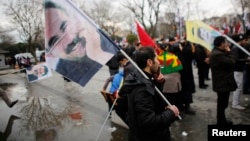Kurdish militants on Sunday described as "historic" a call by their jailed leader to hold a disarmament congress and said Turkey must now take concrete steps to keep the peace process on track.
Abdullah Ocalan, who still exerts influence over the armed Kurdistan Workers Party (PKK) from his prison cell, on Saturday called on followers to meet in the spring and agree to lay down their arms.
Ocalan's call has been lauded by both sides as a crucial step in Turkey's efforts to negotiate an end to a 30-year insurgency that has killed 40,000 people, mostly Kurds.
"Such a goodwill statement presents a very important foundation and opportunity to democratize the state and government and resolve the Kurdish issue and Turkey's basic problems," the PKK said in a statement.
"The government should take sweeping, concrete steps and have a serious political response," it said.
Cautiously welcome comment
President Recep Tayyip Erdogan, who has expended considerable political capital to try to resolve the long-running conflict, on Saturday cautiously welcomed the statement, saying the rebels must now follow through.
Erdogan's ruling AK Party faces a parliamentary election in June and is keen to keep violence at bay heading into the campaign.
"Using this historic goodwill declaration by our leader as election propaganda would be an example of great injustice and irresponsibility for our people," the PKK warned.
The rebels said they also wanted to speak directly with Ocalan to ensure the peace process progressed. Currently, lawmakers in the Peoples' Democratic Party (HDP) shuttle between Ocalan's island prison near Istanbul and the mountainous region of Qandil in northern Iraq, where the PKK's leadership is based.
The European Union, which Turkey is seeking to join, called Ocalan's statement "a positive step forward".
"We hope that all parties will seize the opportunity to make decisive progress towards reconciliation and democratization," an EU statement said on Saturday.
The PKK took up arms in 1984 to carve out an independent homeland in Turkey's mainly Kurdish southeast, but has since scaled back its demands to greater political and cultural rights for the country's estimated 15 million Kurds.





